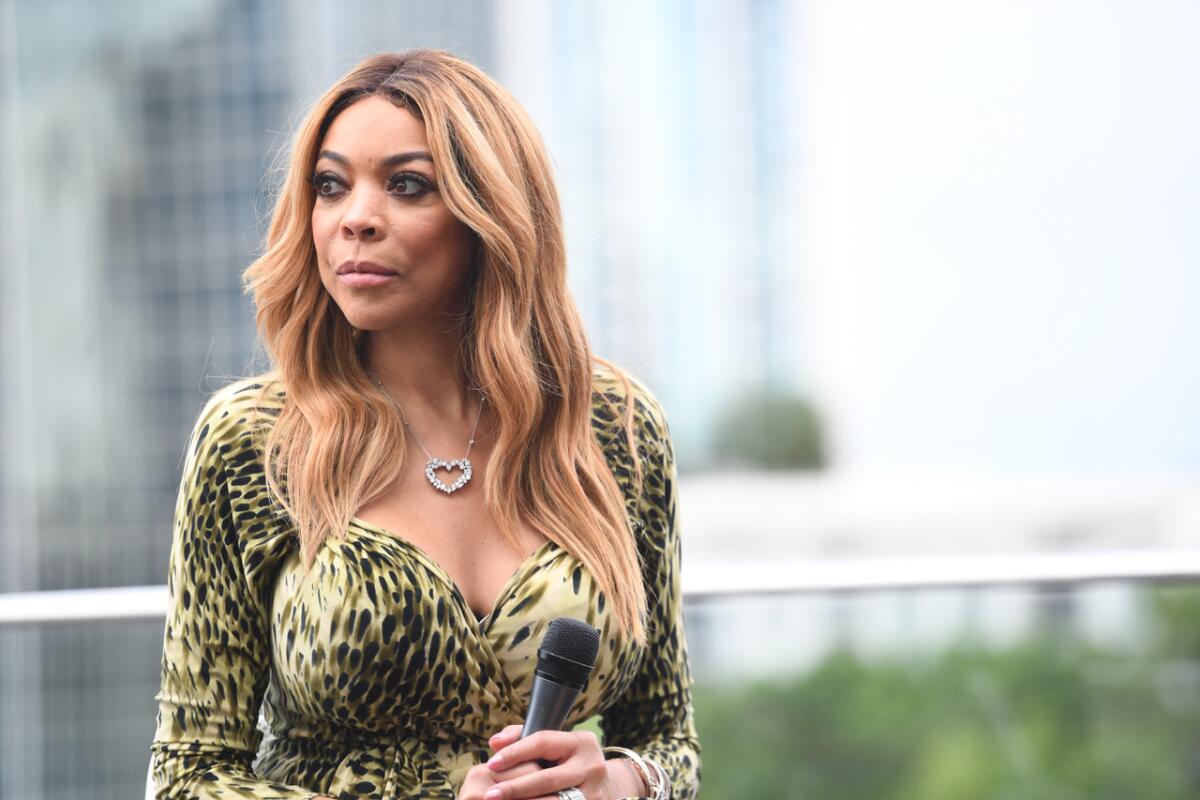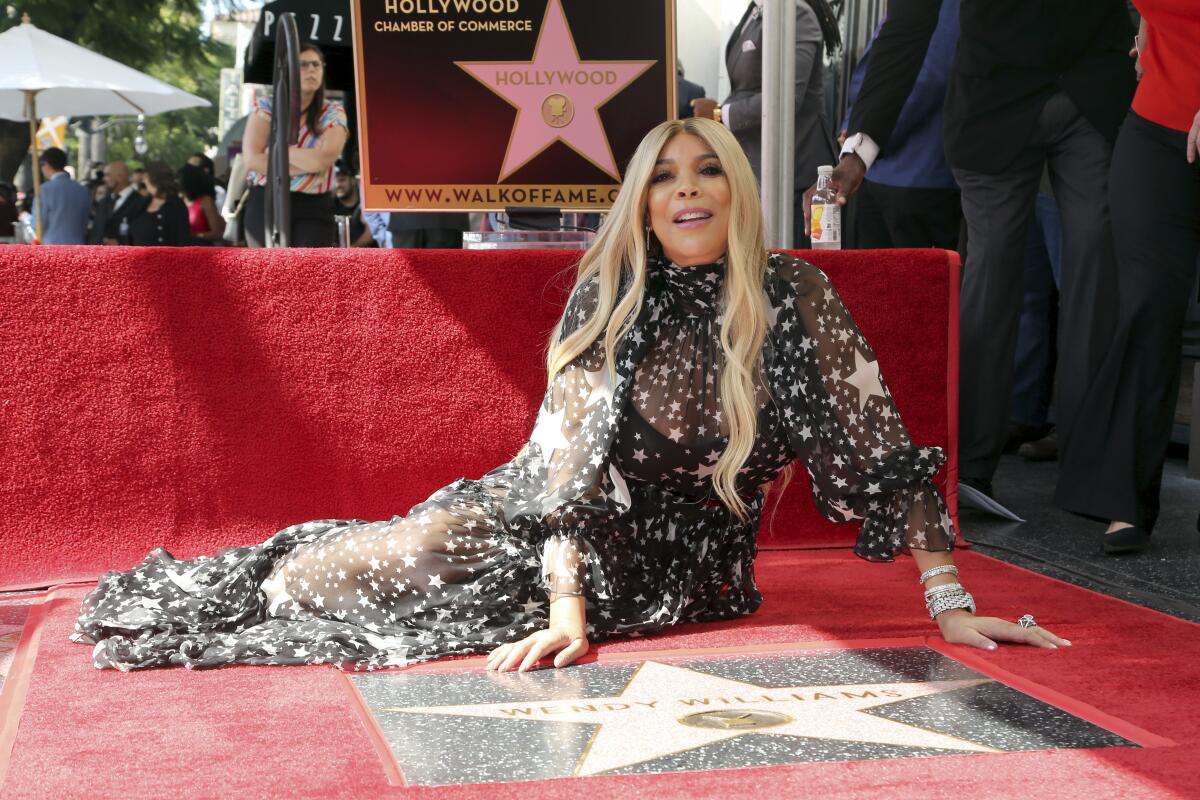Wendy Williams is the queen of ‘I don’t care.’ How do you think she made it this far?

- Share via
The British may have built an empire by selling tea, but Wendy Williams built one by spilling it. Starting on radio before moving into daytime TV with “The Wendy Williams Show” in 2008, Williams covered celebrity scandals with fearless, unapologetic glee — earning a devoted fan base and a few enemies along the way.
But since her marriage to Kevin Hunter began to publicly unravel several years ago — amid allegations of infidelity and abusive behavior on his part — the host and gossip maven has found herself on the receiving end of the tabloid glare. Suddenly, the answer to her catchphrase, “How you doin’?” was a little complicated. (Especially after she passed out on the air.)
This uncomfortable role reversal is explored in two projects airing Saturday on Lifetime. A biopic, “Wendy Williams: The Movie,” speedily traces her rise to shock-jock infamy and the personal challenges she faced along the way, including a rape early in her career, weight struggles, plastic surgery, cocaine addiction, a series of miscarriages and yes, the messy demise of her marriage to Hunter, who was also her manager.
It is paired with a complimentary if surprisingly raw documentary, “Wendy Williams: What a Mess!” in which Williams tearfully opens up about her private life and professional triumphs. Friends, family and colleagues such as Charlamagne Tha God also offer insight into Williams’ unique and divisive role in pop culture.
Williams, 56, is an executive producer on both projects, so while you shouldn’t expect a whole lot of critical soul-searching or impartiality, do brace yourself for plenty of drama.
Before Wendy Williams became a fixture on daytime television with her syndicated gossipy talker she was airing out celebrities on the radio.

You have been trying to make a movie about your life for some time. What made you revisit it now with Lifetime?
Lifetime had been trying to do programming with me for quite some time. I was under old management at that time, my ex-husband, Kelvin [in conversation Williams refers to her ex-husband as Kelvin in order to distinguish from her son, Kevin]. He thought I deserved the best of everything. And he wasn’t willing to settle for less or be patient. And sometimes his delivery was just very rude and harsh and downright ignorant. And it made people turned off to wanting to work with him. And everybody knew that to get to Wendy, you had to work with him. And so people would say — and I’m finding this out now — “Well, let’s just keep an eye on Wendy because she’s something special. And when she dumps him, and hopefully she will, then we’re coming back and we’re going to get to her.” And here we are.
I understand that you actually made a version of the movie many years ago starring Robin Givens. Whatever happened to that?
Everything prior to divorcing Kelvin was a Kelvin thing. That project, I don’t know what happened to it. You’ll have to call him.
This biopic and documentary collectively feel like your breakup project. Do you think of it that way — as a declaration of freedom?
I’m 56 years old. My breakup project is not destroying my ex-husband. I don’t regret meeting him. We fell in love almost instantly. We’ve been through a lot. We don’t come from the same side of the tracks. He’s not a high school graduate. But I saw something in him that was very educated in a way — that he could teach me things. I was already a really popular successful radio personality [when we met]. And I wanted to share that with someone. I have no regrets about marrying him, and I have no regrets about divorcing him. And even if there was no baby, and there was no Sharina Hudson, the baby’s mother [Hunter reportedly fathered a child with his mistress], I had outgrown Kelvin. That’s the best way I can describe it. And I’ve accepted my growth as opposed to fighting it.
The film also portrays the rape you experienced as a young DJ at the hands of an up-and-coming singer. Can you tell me about the decision to include that?
That wasn’t my first time being date raped, but it’s just that it’s only a two-hour movie. One thing that women have that we didn’t have back in the day when it happened to me is strength in numbers. And if we all get together and talk about it, whether we’re pointing fingers at the person or just saying that it has happened to us, then maybe men will be smart enough not to have closed-door meetings or feel that they [can] pinch a girl’s butt. Both things I just walked away from and said, “One day, I will be on my rocking chair and I will tell this to my granddaughters. I will teach them life lessons.” But I never thought I’d be doing this in a movie for one minute.
The movie seems to portray your stint in rehab and a sober house a few years ago as something you did against your will — not something you did because you have a problem with drinking. Is that accurate?
It was 100% against my will. That was a nice place to keep a girl who admits that she has had a problem with cocaine singularly — not any other drugs. Not weed, not heroin. I liked cocaine, I liked crack. To me there’s no difference. I stopped on my own [in the 1990s]. I didn’t even go to rehab. It took me four days to stop. Kelvin put me in rehab; it was like one of those maintaining mental and physical health places. I was the one paying for them — $50,000 a month. I was forced to be there. But then I realized quickly how much I liked it. I made the most of that time and he thought that I was just sitting in there crying all night. No, I got stronger every day. And I read books of people who had gone through similar things — Hollywood girls who had either taken the wrong turn or ended up dead.
Any books in particular?
I don’t want to talk about them. This is about me.
So you weren’t there to get your drinking in check? You feel like your drinking was just a natural reaction to your marital problems?
Yeah, and it wasn’t excessive. It wasn’t something that I wasn’t able to stop. He turned my whole family against me. It’s very easy to believe that somebody has relapsed when that somebody is this nutty girl on TV who laughs loud and cries hard and has admitted to substance abuse in the past. And so I don’t blame my family for believing it. The love between me and my family now is harder than ever. And I’m grateful for that. And the appreciation for Kelvin is still there. I wish him well, but he’ll never have another Wendy.
Did you give notes or advice to Ciera Payton, the actress playing you?
I’ve never met her in person. I had to make sure that the person playing me had my mannerisms, my tics, the wiggles, the teetering, the cadence that I speak with. She’s an actress, a real live actress, so she picked it up fast and we had each other’s private phone numbers. So we talked as girlfriends and I can’t wait to meet her when she comes on the actual talk show. This is a lifetime friendship that will never end.
Did coverage of your marital problems and stint in rehab give you insight into how the press handles celebrity gossip?
I’m not Angelina Jolie or a big actress like that, nor do I want to be. It’s too much. But I had people stake out my apartment. I’ve been hunted down. And you know what I decided to do? I decided to be nice to the people. When they would ask me a question — “Wendy, let me see your ring finger!” — I would say something funny to them. Like, “It’s been a long day, pick a finger.” I would say, “Where are you from?”
They would watch me go into a restaurant. The cameras aren’t allowed in there, so I would tell them about how long I’d be in the restaurant. And I would order a little extra plate. “Are you vegan? Vegetarian?” And I come out with food for them and the utensils and a little hot sauce. And I would pose for a picture and go on about my business. We all have families to feed or we all have to look out for.
The movie also portrays your miscarriages. Talk to me about revisiting that chapter in your life.
I was very public about miscarrying because I was out in public up until five months for two different miscarriages. And when I shared, you’d be surprised how many women opened up and said, “Oh, my gosh, Wendy, that happened to me.” I would get stopped in the streets. I got endless calls on the radio; back then there was a fax machine and I’d get tons of faxes. And it really became very soothing for me to feel like my loss was able to help other people not feel embarrassed, not feel ugly or less than a woman.
At the end of the movie you say you have no regrets. But are there any things you have said you wish you could rephrase?
No. I’m the queen of “I don’t care.” If I cared, I wouldn’t be sitting here in my studio with my big billboard outside on the front of the building in New York City.
‘Wendy Williams: The Movie’
Where: Lifetime
When: 8 p.m. Saturday
Rated: Not rated
More to Read
The complete guide to home viewing
Get Screen Gab for everything about the TV shows and streaming movies everyone’s talking about.
You may occasionally receive promotional content from the Los Angeles Times.






